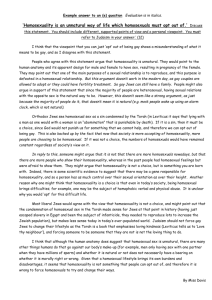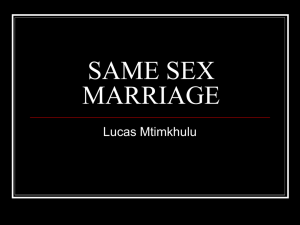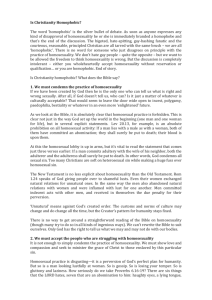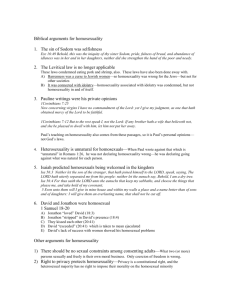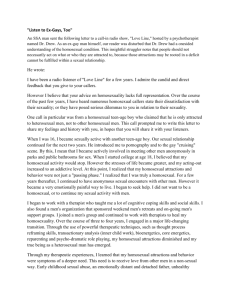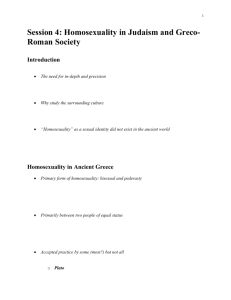How Can Christ`s Lay Faithful Assist Those Who
advertisement
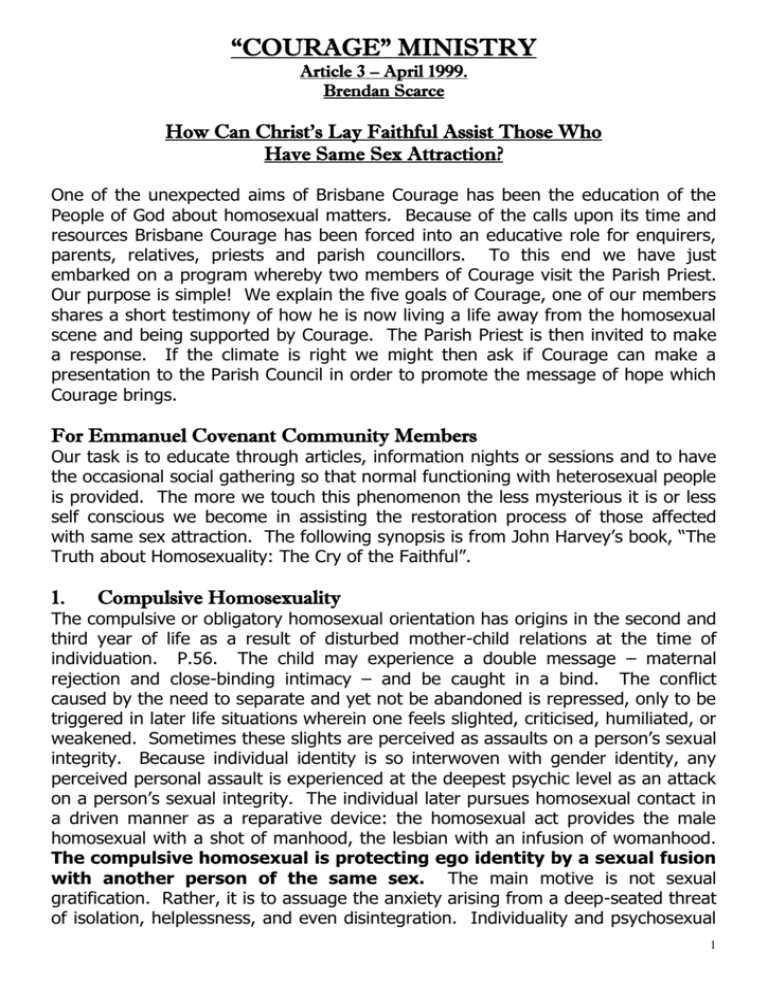
“COURAGE” MINISTRY Article 3 – April 1999. Brendan Scarce How Can Christ’s Lay Faithful Assist Those Who Have Same Sex Attraction? One of the unexpected aims of Brisbane Courage has been the education of the People of God about homosexual matters. Because of the calls upon its time and resources Brisbane Courage has been forced into an educative role for enquirers, parents, relatives, priests and parish councillors. To this end we have just embarked on a program whereby two members of Courage visit the Parish Priest. Our purpose is simple! We explain the five goals of Courage, one of our members shares a short testimony of how he is now living a life away from the homosexual scene and being supported by Courage. The Parish Priest is then invited to make a response. If the climate is right we might then ask if Courage can make a presentation to the Parish Council in order to promote the message of hope which Courage brings. For Emmanuel Covenant Community Members Our task is to educate through articles, information nights or sessions and to have the occasional social gathering so that normal functioning with heterosexual people is provided. The more we touch this phenomenon the less mysterious it is or less self conscious we become in assisting the restoration process of those affected with same sex attraction. The following synopsis is from John Harvey’s book, “The Truth about Homosexuality: The Cry of the Faithful”. 1. Compulsive Homosexuality The compulsive or obligatory homosexual orientation has origins in the second and third year of life as a result of disturbed mother-child relations at the time of individuation. P.56. The child may experience a double message – maternal rejection and close-binding intimacy – and be caught in a bind. The conflict caused by the need to separate and yet not be abandoned is repressed, only to be triggered in later life situations wherein one feels slighted, criticised, humiliated, or weakened. Sometimes these slights are perceived as assaults on a person’s sexual integrity. Because individual identity is so interwoven with gender identity, any perceived personal assault is experienced at the deepest psychic level as an attack on a person’s sexual integrity. The individual later pursues homosexual contact in a driven manner as a reparative device: the homosexual act provides the male homosexual with a shot of manhood, the lesbian with an infusion of womanhood. The compulsive homosexual is protecting ego identity by a sexual fusion with another person of the same sex. The main motive is not sexual gratification. Rather, it is to assuage the anxiety arising from a deep-seated threat of isolation, helplessness, and even disintegration. Individuality and psychosexual 1 identity are so enmeshed that homosexual activity served to stave off the threat of psychic disorganisation. 2. Symptomatic Homosexuality Symptomatic Homosexuality is a symptom of a more general personal problem. The homosexual activity attempts to resolve some ancillary conflict that has become sexualised. Symptomatic homosexuality has a driven quality too, but it falls short of the obligatory strength of compulsive homosexuality. The unresolved issues that may lead to homosexual adaptation within symptomatic homosexuality are: 1) problems of unsatisfied dependency needs, 2) unresolved power or dominance needs, and 3) fear of heterosexuality. Some youngsters feeling unaffirmed and deprived of affection come to look for acceptance on any terms. They may drift to homosexuality hoping for affirmation and thereby solidify homosexual leanings. Homosexual behaviour becomes a constant obsessive search for affirmation. For others, homosexuality may be a quest for dominance, a source of power. In one case example a man acknowledged his motivating hatred of parents. Homosexuality was a way to strike back at parents he felt had failed him and whom he resented implacably as well as striking back at a self he demeaned as weak. It is not uncommon that a male homosexual cannot continue having sex with a male partner as genuine affection toward him deepens; he senses that for him sex has been a devious and deviant way to dominate. I stress that the quest for power and dominance is a feature of some but not all cases. 3. Episodic Homosexuality Episodic homosexuality behaviour may occur in situations where heterosexual activity is not possible, in prison for example. Homosexual behaviour may simply express a countercultural protest against conventional standards and inhibitions, a declaration of liberation by having erotic adventures. Some persons engage in homosexual acts for money, in search of a new thrill, or from indifferent sexual morality. For these and other reasons the definitive criterion of sexual orientation is not necessarily sexual behaviour. 4. Change of Orientation: Is it Achievable? This is a difficult and vexed question. There is substantial disagreement among many writers about the relative strength of hormonal, genetic and psychological factors in the aetiology of homosexuality. Harvey (p.71) from his reading and pastoral experience leans towards “those theories which regard the psychological as more important than the genetic or the hormonal” – in the development of homosexuality. The decision of the American Psychiatric Association in 1973 to withdraw homosexuality from the third edition of the Diagnostic and Statistical Manual (DSM III) is a political decision stating that homosexuality is a normal 2 variant of human sexuality. Subsequently it is difficult for a professional therapist to question the widespread notion that sexual orientation is unchangeable. Many schools of Psychology accept this line of reasoning. Nonetheless Harvey asserts the way out of the dilemma is that: “we need to make a distinction between having an orientation without deliberate choice and having the capacity to change one’s orientation through deliberate choice of the means of change found in the order of nature and of divine grace.” In pages 72 – 114 he discusses the pros and cons of those for and against the possibility of changing one’s sexual orientation. This might be a useful appendix for another time. It is useful for us who are involved in Courage to agree with Harvey’s remarks on p.114. “Thus from the combined testimony of secular professionals and religious counsellors, one may draw the modest conclusion that some persons with a homosexual orientation can acquire a heterosexual one through a process of prayer, group support and sound therapy". The Harvey plan can best be summarised as follows: 5. Sexual Abstinence and Homosexual Orientation For the person who is unable to be rid of the ‘condition of homosexuality, for whatever reason’ Harvey suggests certain points. For those who realise that the only way to fulfil the divine mandate of chastity is to practice sexual abstinence he makes five comments: 1. Sexual abstinence means precisely the avoidance of genital acts and all that leads up to organism. NB it does not mean that one may not express physical affection by non-genital acts, such as kissing, hugging and embracing. 2. Such sexual abstinence becomes a form of love if the motive is the love of Jesus Christ. In this way sexual abstinence becomes consecrated celibacy. It is the only effective motive. 3. One should not allow the practice of celibacy to become a burden. One needs to strengthen his love for Christ through the daily habit of prayer of the heart (mental prayer) and through the formation of chaste friendships. 4. One must work out a spiritual strategy for contending with bouts of loneliness, restlessness and discouragement. It is important to have a spiritual director or friend one can call. In this way one remains in the real world instead of the world of fantasy and isolation. 5. One has to be aware of dangerous changes of mood, which in the past have triggered bouts with masturbation or cruising or indulgence in pornography. 6. Is a Catholic With An Homosexual Orientation Obliged to Change Harvey’s response (117) “an obligation does not bind in conscience unless the moral law clearly demands it and the person is able to carry it out”. Currently, there is no “guarantee in our present state of knowledge that if one were to follow a certain program and plan of life to change orientation it would always happen”. “The basic ethical principle applicable to this situation is that one cannot impose an obligation unless one is certain it exists.” Consequently a person 3 with homosexual tendencies does not have an obligation to take steps to change his orientation although he is bound to sexual abstinence by the Gospel precept of chastity and to the means of practicing chastity. Clearly the answer is NO regarding the obligation to change an orientation – but it is clear that a person living a life worthy of their calling in Christ has to live a chaste life developing an “interior chastity”. 7. The Role of “Courage” in Supporting a Chaste and Peaceful Life One of the sad myths for the young person is that believing he cannot be freed from the homosexual condition he gives up hope. He thus becomes vulnerable to the gay propaganda which states that homosexuality is a natural variant to heterosexuality and that the gay lifestyle is an alternative to marriage/chaste single life style. The person with homosexual orientation lives in the occasion of sin in a special sense; that is to say, the occasion of sin is within his own heart and mind. (NB this statement is not meant to condemn the person but illustrates the pastoral need to develop mental and ascetical practices for those seeking to live a chaste life.) Experienced older members of Courage report that they opt for a life of sexual abstinence while developing and practicing an interior life of prayer with Christ. If they were told that they must change their orientation, many would not come back the following week. For this reason Courage does not make a change of orientation an obligatory goal. At the same time Courage places greater stress on the need to move away from homosexual ways of thinking and feeling. Conclusion The Courage group provides an environment of men sharing, wrestling and gaining wisdom and support in their struggles with same sex attraction. The Emmanuel Community is blessed with a great group of men – dedicated to God’s ways, life and prayer. I propose a challenge for some of these men to adopt or provide a mentoring or “straight” role model for the Courage members. I urge you to provide this brotherhood – which is a deep healing encounter of God. “Brother helped by brother is a fortress”. Proverbs 18:19. “Courage” is a ministry of Emmanuel Covenant Community Post Office Box 151, Geebung. Qld. 4034. Telephone (07) 3345.4461. Email: brisbanecourage@bigpond.com 4
